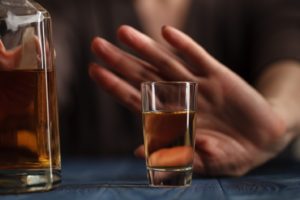
Research has found that 15 – 18% of people use alcohol to help them fall asleep. Some do so just once in a while, while others rely on their nightly adult beverage as a way to unwind and get some well-deserved shuteye. Alcohol can certainly help you fall asleep faster — but it shouldn’t be used as a sleep aid, especially if you suffer from obstructive sleep apnea (OSA). Let’s talk about the negative relationship between alcohol and sleep apnea in Ponte Vedra Beach.
Alcohol and Sleep Apnea
Alcohol is classified as a depressant. It affects your central nervous system, causing the muscles throughout your body to relax, including the muscles in the throat. Those muscles may even overrelax, leading to obstructions in the upper airway. As a result, you may suffer from more frequent and longer apneas (pauses in breathing) throughout the night. The more severe your OSA is, the lower your blood oxygen levels become. At the same time, the level of carbon dioxide in the blood increases. This condition, called hypercapnia, can cause a range of adverse symptoms. In rare cases, it can even be fatal.
In addition to worsening your apneas, alcohol has a generally negative effect on the body’s drive to breathe. There is even research to indicate that people who do not normally suffer from apneas may do so if they consume alcohol too close to bedtime.
Should You Abstain from Alcohol?
The above information might sound a little scary, but there is no reason to despair. If you enjoy alcohol, you can probably continue to do so even if you suffer from OSA. However, it is important that you take some practical precautions to protect your health and improve the quality of your sleep. Here are a few suggestions:
- Don’t drink too close to bedtime. Your alcohol should be fully metabolized before you go to sleep. It takes an average person one hour to fully metabolize one standard drink.
- Enjoy alcohol in moderation. Many medical experts agree that in general, men should limit themselves to two drinks a day, while women should have one drink at most.
- Comply with your OSA treatment. Using your CPAP machine or oral appliance every night — especially after you drink alcohol — can help you to breathe easily throughout the night.
Tips for Falling Asleep Faster
Instead of using alcohol as a sleep aid, try these tips to fall asleep faster:
- Do not use electronic devices in the last couple of hours before bed.
- Make sure your bedroom is clean, comfortable, and slightly cool.
- Use breathing exercises to help you relax. For example, you might try inhaling for 4 seconds, holding your breath for 7 seconds, and then exhaling for 8 seconds.
- Talk to your doctor about any serious sleep problems you experience.
Alcohol before bedtime can worsen your sleep apnea. It’s best to say no to a nightcap and use other methods to help you fall asleep.
Meet the Practice
Drs. Kristopher Harth and Eric Townsend are the talented, experienced dentists in Ponte Vedra Beach at our practice. Both of them are dedicated to continuing education and have completed training at numerous prestigious facilities. If you suffer from OSA, they may be able to help you find relief via oral appliance therapy. To learn more about our practice and how we may be able to serve you, contact us at 904-285-7711.



